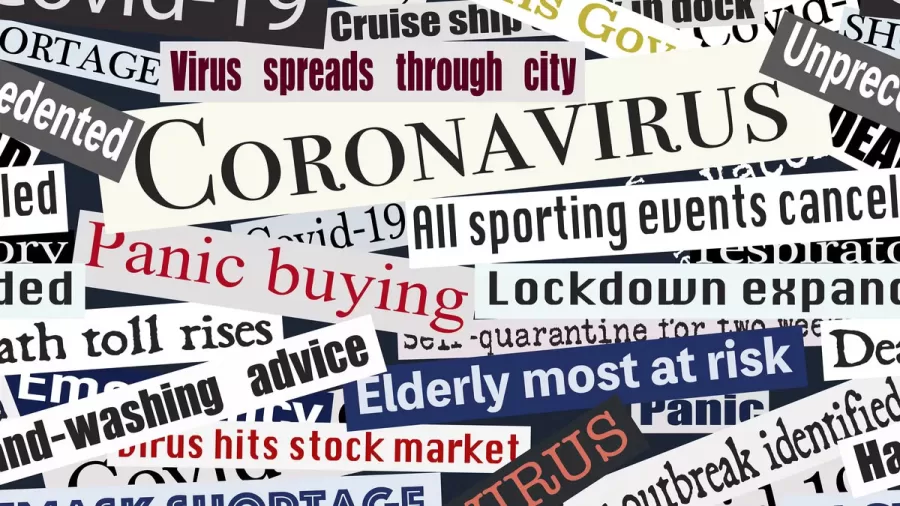Opinion | Conspiracy theories leech off social media
Photo courtesy of Felton Davis / Flickr
Senior columnist Maggie Knutte argues that social media plays a large part in the formation of conspiracy theories.
Feb 9, 2023
Spoiler warning: This column contains spoilers for the Netflix documentary “The Social Dilemma.”
There is an epidemic. It’s taking over every household — every person alive. It’s consuming our every being until we are mindless zombies. It fits onto your tiny phone screen. It’s leeching off of your attention, controlling you like a puppet. It’s disguised as a brightly colored app.
Social media is the master of the compliant public.
Large tech companies birthed out of Silicon Valley have been exploiting the public since their start. Raking in billions of dollars per year — which only increases each year from advertisers — these oligopolies continue to look for new ways to feed their bottomless greed and keep users scrolling.
In September 2020, The Social Dilemma was released on Netflix. The documentary features insights from former employees of social media companies who detail the disturbing truths behind the motivations of companies like Facebook, Twitter and Pinterest. It also follows the realistic enactment of a boy whose life becomes destroyed by the addictive algorithms of social platforms. This boy falls victim to the dangerous conspiracy theories that plague social media sites, falling down a rabbit hole that ends in police custody.
Get The Daily Illini in your inbox!
Despite this revolutionary documentary’s release, we are still facing the same issues it highlights three years later. A research article published in 2021 on Frontiers’ online journal looked at the use of social media as a news source and its effect on the belief of conspiracy theories. Consistent with previous research, the study found that people using social media as a news source are more likely to support conspiracy theories.
Many, despite their intentions, end up getting their news from social media. This is usually harmless. For example, you might see a post about a local high school student attending an Ivy League school or a missing poster for a dog. However, there are also dangerous, targeted theories and hoaxes out there that are bigger than most people realize.
During the 2016 presidential election, a conspiracy known as #PizzaGate blew up. Started as a political rumor against candidate Hillary Clinton, it soon spiraled into something dangerous. The conspiracy theory suggested that pizza restaurants were being used for child trafficking and sex trafficking by the Democratic Party.
Edgar Maddison Welch was a young man from North Carolina who was tricked by this conspiracy. On Dec. 4, 2016, Welch entered Comet Ping Pong pizzeria on. Thankfully, no one was injured, but this could have easily been another mass shooting.
Welch genuinely believed he was saving children from human trafficking, and now regrets his decisions after serving four years in prison because of it. A widespread conspiracy theory like this has the potential to take lives.
Social media companies can try to regulate the spread of misinformation — the intentional distribution of falsities — but catching every conspiracy theory in their virtually infinite stream of content doesn’t seem like a close reality. Educating yourself and fact checking and questioning what you see can help prevent you from falling victim to these destructive lies. Conspiracy theories aren’t always outlandish — they can creep up on and convince even the most informed people.
Government conspiracy theories have always been around, but now with the instantaneous nature of social media, it is much easier for someone to create a rumor or theory and spread it. The scariest part is that the number of people believing in these theories seems to be as high as ever.
Since 2020, conspiracy theories surrounding COVID-19 have been massively popular. One of the more popular theories is that COVID-19 was planned by people in power. A Pew Research study found that 25% of adults polled believed that there was some truth to this theory. Another popular theory is that COVID-19 isn’t even real. For a disease that kills, spreading conspiracies could cost someone their life.
Social media companies don’t appear to be changing their algorithms. More than anything, they are trying to keep you on their sites for longer, possibly increasing your chances of being exposed to disinformation. If it gets them clicks, they don’t care.
Laws to protect the public on social media can take up to a year to get passed, and that’s if they can make it through the whole process. Everyone needs to take measures now to protect themselves. In a society that is chronically online, we are exposed to more information than ever. Don’t let yourself be consumed by the Alex Joneses of the internet.
Maggie is a sophomore in Media.






